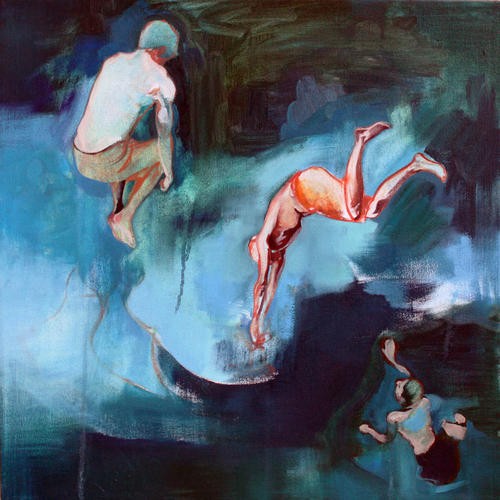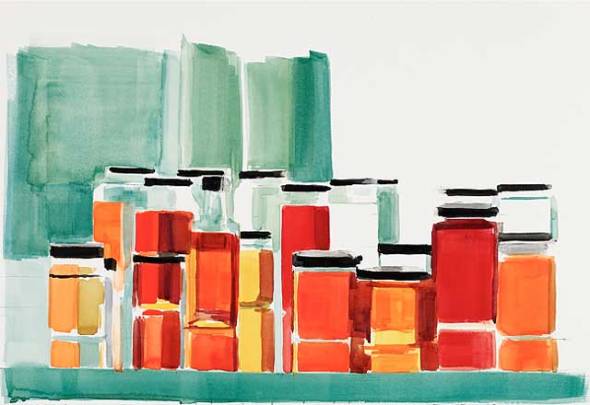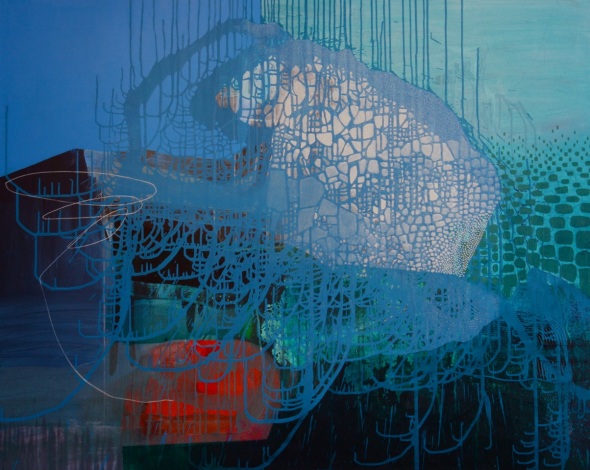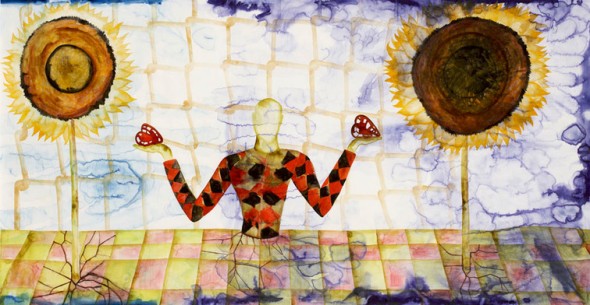Leap into blue
Posted: July 12, 2013 Filed under: Galleries, Private Collections | Tags: art, artsicle, big leap, boys, brotherhood, Charlotte Evans, contemporary art, sibling rivalry, summer, swimming, water Leave a commentEvan irritated him. He squeezed his eyes shut, “Life would be so much better without you.”
Mean scratched his heart — a selfgrown claw. He did not have Evan’s unbound affection that flowed from his middle brother to halo those close around.
But not him. He shrugged away from any touch. Next too Evan’s brightness, he shadowed deeper into gloom. Water traced his back, eddied down past his fingertips. Drip. The air, warmed all through, pressed against him. Toes crushed soft fern.
Bennet he loved — buoyant — from the beginning as he despised Evan. Bennet could coax a laugh from his darkwild mind.
Yet, with a sound splash, they sunk all three, into bluegreen brotherhood. On land that was unstable and ill-suited, now washed away in slosh of wet and calm harbor shade. Minnows caught in army green weeds. Caught in boy fingers too. Crawdads fast cranny into holes, clawpinch sunken treasure of rotted slime. Oaks cradle earth on their knees and feel the pressure of boy feet in their arms.
With a warholler.
Leap into blue.
Warm crashes into cool and wet. Plunges him and them all into deep unworry and forget.
These are the idyll days they try to recall. When spring fed pools make everything fine. And found in their ragged bounds — a sudden solace.
Tricks that Shadows play
Posted: July 6, 2013 Filed under: Galleries, Private Collections | Tags: art, art quotes, bottles, contemporary art, light, Peri Schwartz, shadow, watercolor, Willa Cather Leave a comment“Every artist knows that there is no such thing as “freedom” in art. The first thing an artist does when he begins a new work is to lay down the barriers and limitations; he decides upon a certain composition, a certain key, a certain relation of creatures or objects to each other. He is never free, and the more splendid his imagination, the more intense his feeling, the farther he goes from general truth and general emotion.
Nobody can paint the sun. or sunlight. He can only paint the tricks that shadows play with it, or what it does to forms. He cannot even paint those relations of light and shade – he can only paint some emotion they give him, some man-made arrangement of them that happens to give him personal delight – a conception of clouds over distant mesas (or over the towers of St. Sulpice) that makes one nerve in him thrill and tremble. At bottom all he can give you is the thrill of his own poor little nerve – the projection in paint of a fleeting pleasure in a certain combination of form and color as temporary and almost as physical as a taste on the tongue.”
– Willa Cather, Light on Adobe Walls
Naked
Posted: April 7, 2013 Filed under: Galleries, Museums, Private Collections | Tags: 5X7 Splurge, AMOA, art, art fundraiser, art valuation, Arthouse, Cassie Normandy White, naked, value creation Leave a commentI attended an intriguing art fundraiser last night. The art was stripped naked.
By that I mean that the event concealed the identities of the artists. The 5X7 Splurge at AMOA-arthouse, Jones Center stacked a white room with shelves of mysterious minis — over 500 small format various media miniworks (some 3D) by wide ranging artists and sculptors. All art — one price – $150.
But you have to wait for the bullhorn to buy. Yes. Its blare tore through anticipation in the museum as high style people grappled over each other to rip off little silver tabs hanging by each painting. If you snag the tab the art is yours. “Negotiations” between patrons for popular pieces – fierce. But let’s not talk about my social inappropriateness here.
I’m interested rather — in the naked place. The place where you view art stripped of all context, all brand, all socially perceived value. Only the piece and your eyeball.
How to choose from the multitude? What do I internally do to create a $150 value for a work the size of a 50¢ postcard?
I tried to analyze. Hmmm. . . what is the quality of the drawing/painting? How does the piece address the size constraint? What is its materiality? Does its presence defy its borders? Does it break the plane, do something interesting/unexpected? This intellectual toying was my catbrain with a string.
But my emotions agonized. I didn’t want to be wrong — to pick a sub-par piece. I second guessed X 10. I wanted someone to fight me for the tab I grabbed (but I didn’t). I wanted the Antiques Roadshow Moment – “you’re kidding, my painting is worth what???” I wanted to see what no one else saw. Naked value creation – for my ego.
Why couldn’t I pick a piece and just enjoy it?
Well eventually I did. See above. And I learned again what I keep on learning. Be brave. Love it just because you love it.
And because your friend — who is a consummate judge of art — approved.
un-story
Posted: April 5, 2013 Filed under: Galleries | Tags: art, Austin artists, blue, contemporary art, Court Lurie, dishes, emotions, mindfulness, narrative, roomates, Russell Collection 1 CommentWe think we see with our eyes. We don’t. We see with our expectations.
So I like Court Lurie’s art because there is no expectation of narrative or story structure. Narrative gets spooned to us all day long framing our view, pulling about our emotions, puppet-stringed by the story teller. Ourselves perhaps.
We don’t just “do the dishes” — we slog through dishes for the two hundredth time for our self-absorbed roommate, who only thinks of herself, just like when as a kid, latch key in hand, made supper and scrubbed through chores until the parents got home. Right now the dishes are little injustices we’ve hauled around through the timeline titled, “my life as a loner.” Suddenly a red plate goes crashing. Or a mug rage-tossed over the balcony. Leaving a pottery shard pattern on the sidewalk.
These implicit historical narratives wriggle into the everyday, drip and eddy around. Wordless tangles of old tapes playing almost inaudibly in the background. Stories about everything we do. If you start to get emotional about picking out your outfit, or why the stapler is missing, or why you have to pick up those legos again, or why your boss is mean to you — search for the narrative you are telling that colors the event, that nets around and crumples you into an emotional wad.
What if we “un-story?” What if the boss is a bitch, because the boss is a bitch. What if we pick up the legos, because we are picking up the legos. What if our actions and events are not representative of a multilayer narrative that started in vitro?
If the roommate is a lazy ass-moocher, kick ’em to the curb. Lose the roommate, lose the self story.
Pick up a Court Lurie at the Russell Collection, April 6 – May 5, 2013.
Definitely a better roommate, but doesn’t do dishes either.
star filled night
Posted: March 29, 2013 Filed under: Galleries, Museums, Private Collections | Tags: art, contemporary art, Milky Way, Peter Doig, poetry, steve roggenbuck, yolo 1 Commentin the absolutely dark sea i have birds that
land on me and go inside me
let me go near you to touch you
let me put my birds
exactly in your mouth
what can i do with your moon lighted and
bare knees
what is there now
every thing on you i want
you are somthing softer than star filled night
open up my
cranes in you
open up my cranes
steve roggenbuck from i am like october when i am dead, 2013 reprint
Mother Earth
Posted: March 16, 2013 Filed under: Galleries, Private Collections | Tags: Andy Curlowe, art, contemporary art, daniel alexander, earth body, landscape, modern poetry, mother earth, old as dirt, poetry, yolo Leave a commentI went to a Millennial poetry reading last night literally sitting on the train tracks. I peed in a bathroom lit only by a black light and watched the torn pieces of toilet paper scattered-squat on the floor, glowing bits of paper eyes. I heard poetry like this.
earth body
imagine trees growing out of your arm
people walking all over you
cars and trains polluting the air you breathe
octopuses spraying bad tasting ink in your mouth
nuclear bombs going off around your neck
oil rigs digging under your skin
kimono dragons fighting each other in your hand
polar bears swimming in your eyes
a dad dropping a plate of hotdogs on your knee
meteors from space hitting you in the head
the inside of your body molten hot
and you cant escape any of it
this is what is feels like to be mother earth
daniel alexander from slime dog you are my friend
And I remembered again that I am not young anymore. I am old as dirt.
A history of the Heart, Pt III
Posted: February 14, 2013 Filed under: Galleries, Museums | Tags: art, compassion, contemporary art, Francesco Clemente, history of the heart, Jane Austen, joker, love, rainbows, shakespeare, valentine's day, What is love 1 CommentYou know the moment when you’ve collided with a hole.
You reach out to your loved one, offering a hug or smile, and swipe air. That holy-shit-what-happened-here moment. See — the faceless joker holds hearts pierced thru, these holes are what I am talking about.
The trauma spots wriggle into everyday life and reduce a beautiful competent partner to a raging tear-flung lunatic in the event of misplaced car keys. They morph a normally affection-able partner into a cold-hearted bastard. Don’t expect a movie about this or even an HBO series. These heart holes open at a moments notice — white-hot or pale-cold — to suck all good comfort dry.
This is the un-fun part of love. The possible break-up part. Doesn’t make a good Jane Austen book. Or Shakespearean sonnet — This.
Maybe you choose to wander through childhood piercings/past relationship woes with your partner or friend. Maybe not. Either choice acceptable. You can still be friends — you can still be lovers. Much depends on the sunflower.
The joker here is a scale, balancing the Swiss hearts. Two up-sized sunflowers flame divine, possible healers. The repetition of a table cloth, our daily life, interrupted and cracked by the hole moments. Making us decide how much we are willing to give. Is there enough sunself in us to comfort or at least stay calm. Enough to try to understand another? Would they do the same for us?
Don’t try to mend, fix, or patch these holes. See them, and notice their shape. Such sighting takes un-named courage. We decide if we want to give it. Maybe we will keep it for ourselves.
But I have an interesting idea about compassion when its shared. It tends to grow . . . for both. And this, I call this love.
A history of the Heart – Pt II
Posted: February 13, 2013 Filed under: Galleries, Museums | Tags: art, contemporary art, Francesco Clemente, heart, isolation, love, valentine's day, What is love, who survives Leave a commentIn a gallery far far away. . .
HERS: Need I explain a heart surrounded in darkness? Dark knot of isolation. A heart in safe surround, in pearl white hermitage?
HIS: This looks like pretty much like guts to me. A heart stuck in a white gumball in outer space. Simple.
HERS: Are you kidding? This heart is asking BIG questions– motheaten through heart — has decisions.
HIS: Those are holes? Naw, those are bits of shaving cream left over from a dull razor. Or maybe blind spots.
HERS: Will the blackness be a self-grown cancer that tightens in the belly of this relationship? Refusing to nourish? Feeding only.
HIS: Oh God I’m hungry — how long before our table’s ready (checks his phone for a text message from the restaurant, looks up) You are missing the heart-shaped skittles everywhere.
HERS: Or is the dark slowly being broken, digested by compassion, melting in its multi-hued warmth? Multitudes of heart shaped cells of care. Kind words, kind actions, a little kiss, a full on hug, a compliment, a cup of coffee, a belly laugh.
HIS: Ugh sounds like too much work. This is inside a belly isn’t it? Get in my BELLY! Ha!
HERS: (Rolls eyes) The reasons for this heart’s self enforced privacy are probably pretty good. Protection. Survival even.
HIS: Survive? Who survives love?
A history of the Heart – Pt 1
Posted: February 11, 2013 Filed under: Galleries, Museums | Tags: art, contemporary art, Francesco Clemente, heart, history, love, rainbows, What is love 3 CommentsRecently the question “what is love” google-ranked into the top ten question searches. Who’s asking? Who isn’t?
What is love? That depends on what time it is.
Is it the time when the great noise parted — the only sound — the breathing of you and another? Whose dilate eyes held in them all your healing and possible death. Who captured your soul with their fingers?
Is it the time — fifteen years in, goldfish crackers crunched to floor, high on exhaustion, child echo in your ears, when you look to your partner and feel a sense of long-lived loyalty.
Is it the time after you’ve thrown a rose down an earthen box, heard it soft thump. Tasted your tears and groped around to find some feeling to name? A duty — and still is love.
The truth is — love grows and dies on the same tree — our lives. We have a myriad hearts we’ve encaged to many people and things. And our several loves, delicate hued, have a variable shelf life. Your limited number of hearts, your time-limited love. To lavish on others, to lavish on ourselves.
We want to be free, but we want to be loved. One condition opposes the other. And the struggle between the restrictions of love and the care of self are paid in seconds ticking by. We make choices. So the cage door closes and the cage door opens. The joy close. The sorrow open.
These intricate economies of time and passion we call love.
In love
Posted: February 9, 2013 Filed under: Galleries | Tags: art, contemporary art, love, Melon, painting, still life, Todd Kelly 4 CommentsI haven’t fallen in love for awhile. Don’t have the time. Probably not the emotional energy either.
But here I’m crushed.
Love at first sight, when I didn’t believe in love at first sight.
It’s a still life, but I didn’t recognize that at first. The surging lines and the color. Still life’s are usually. . . so still and this one has all the right moves. Sexy even. Line meets color. Two distinct elements, separate then join together in overall composition. Line teases your eye out then the color pulls you back to center. Two to tango.
I may love it more than — my iphone.









